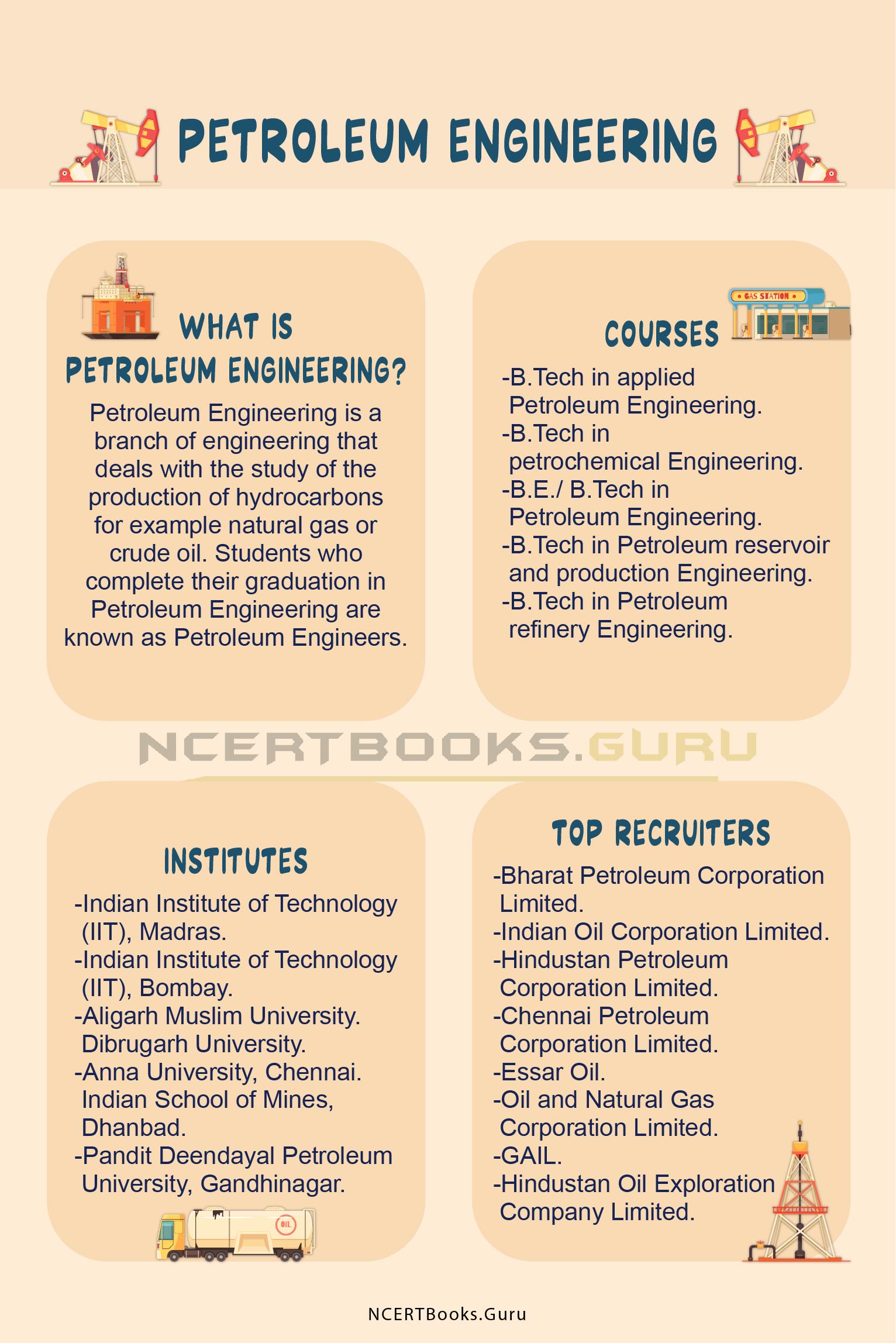How to Become a Petroleum Engineer in India: The Petroleum Engineering field was introduced in 1914 at the American Institute of Mining, Metallurgical, and Petroleum Engineers, and the first Petroleum Engineering degree was awarded by The University of Pittsburgh in 1915.
Learn what is petroleum engineering course and how to become an Indian petroleum engineer easily from this ultimate guide. However, you will also find the details like petroleum engineering scope in India and salary of petroleum engineer in India per month along with the steps to become a petroleum engineer in India.
- What is Petroleum Engineering?
- Types of Petroleum Engineering
- Skills Required to Become a Petroleum Engineer in India
- Eligibility Criteria to Become a Petroleum Engineer in India
- Petroleum Engineering Courses in India
- Admission Process To Enroll for Petroleum Engineering Courses in India
- Top Institutes for Becoming Petroleum Engineering in India
- Subjects Covered in Petroleum Engineering Course
- What are the Roles and Responsibilities of a Petroleum Engineer?
- Petroleum Engineering Jobs in India
- Top Recruiters for Petroleum Engineering Graduates in India
- Petroleum Engineering Salary Per Month in India
- Best Petroleum Engineering Books and Study Materials
- FAQs on How to Become a Petroleum Engineer After 12th in India
What is Petroleum Engineering?
Petroleum Engineering is a branch of engineering that deals with the study of the production of hydrocarbons for example natural gas or crude oil. Students who complete their graduation in Petroleum Engineering are known as Petroleum Engineers. Since Petroleum is one of the major sources of energy in the current century, building a career in Petroleum Engineering is a very interesting and challenging career option.
To become a Petroleum Engineer in India, you must have knowledge of various disciplines such as Petroleum geology, drilling, economics, geophysics, formation evaluation, reservoir engineering, reservoir simulation, artificial lift systems, well Engineering, etc.
Types of Petroleum Engineering
- Drilling Engineers: They deal with the technical aspects required in drilling.
- Reserve oil Engineers: They enhance the production of gas and oil.
- Production Engineers: They handle the interaction between reservoirs and the wells.
Keep reading this article to know more about how to become a Petroleum Engineer in India, the requirements to apply for courses in Petroleum Engineering, petroleum engineering scope in India, etc. So let’s begin!
Skills Required to Become a Petroleum Engineer in India
Following are the main skills required for becoming a Petroleum Engineer in India:
- Team working skills
- Conceptualization skills
- Numerical skills
- Analytical skills
- Problem-solving skills
- Communication skills
Eligibility Criteria to become a Petroleum Engineer in India
In order to become a Petroleum Engineer in India, you must have passed 10+2 examinations with a science stream from a recognized Board of Education bachelor’s and also need to complete a bachelor’s & master’s degree in Petroleum Engineering. The students who have completed their graduation in Chemical Engineering or Mechanical Engineering can also work in this field.
Petroleum Engineering Courses in India
Following are the most preferred courses in the field of Petroleum Engineering for both undergraduate and postgraduate programs:
Graduate courses: These are various bachelor’s B.tech courses in this field and the duration of these courses is 4 years.
- B.Tech in applied Petroleum Engineering
- B.Tech in petrochemical Engineering
- B.E./ B.Tech in Petroleum Engineering
- B.Tech in Petroleum reservoir and production Engineering
- B.Tech in Petroleum refinery Engineering
Post Graduate Courses: These are (master’s) Mtech courses and the duration of these courses is 2 years.
- M.E/M.Tech in Petroleum exploration
- M.Tech in Petroleum refinery Engineering
- M.Tech in Petroleum refining and petrochemical Engineering
You can also go for a B.Tech + M.Tech in Petroleum Engineering which is a dual degree course and has a 5-year duration.
Admission Process To Enroll for Petroleum Engineering Courses in India
The candidates who want to go for a bachelor’s degree in Petroleum Engineering can apply for the same via an entrance test. The admission process is different for different colleges. Candidates can appear for the JEE mains examination which is a national level entrance examination organized for admission in B.Tech courses.
The candidates who want to go for the master’s degree in Petroleum Engineering can go for the entrance examinations for the same. The entrance examinations for master’s courses are conducted at the university, state, and national levels.
The Graduate Aptitude Test in Engineering (GATE) is the most popular entrance exam that provides admission to students in the first year of a master of technology Engineering course. Most of the institutions do the admissions on the basis of the GATE score of a candidate.
Some institutes might take their own entrance examinations for the admission process. The UPESEAT is one of the most reputed examinations that is administered by the University of Petroleum and Energy Studies, Dehradun for getting admission to Engineering courses in Petroleum Engineering.
Do Refer:
Top Institutes for Becoming Petroleum Engineering in India
Following are the most reputed institutions which provide premium quality education in Petroleum Engineering Courses:
- Indian Institute of Technology (IIT), Madras
- Indian Institute of Technology (IIT), Bombay
- Aligarh Muslim University
- Dibrugarh University
- Anna University, Chennai
- Indian School of Mines, Dhanbad
- Pandit Deendayal Petroleum University, Gandhinagar
- University of Petroleum and Energy Studies (UPES), Dehradun
Subjects Covered in Petroleum Engineering Course
Following is a list of the subjects in a Petroleum Engineering course:
- Environmental Studies
- Mechanics of Solids
- Fluid Mechanics
- Material and Energy Flow Computation
- Applied Geology
- Surveying
- Basic Electrical Engineering
- Basic Electronics Engineering
- Reservoir Engineering
- Introduction to Petroleum Operations
- Drilling Engineering and Well Completion
- Heat Transfer Process
- Natural Gas Engineering
- Production Engineering
- Chemical Thermodynamics
- Applied Numerical Methods
- Material Science
- Well Log Analysis and Well Testing
- Industrial Management
What are the Roles and Responsibilities of a Petroleum Engineer?
Following are the roles and responsibilities of a Petroleum Engineer while they are working in the sector:
- Petroleum Engineers develop various techniques that can be used for the enhancement of the oil recovery process.
- They have the responsibility to make sure that all the equipment required in the oilfield is working properly.
- Petroleum Engineers are responsible for designing technologies and new ways to recover various hydrocarbons.
- They develop equipment which is used for extracting oil and gas from the earth in a very efficient way.
- They have to take the responsibility to keep improving the quality and cost-effectiveness of the procedure of hydrocarbon extraction.
Must See: How to become a Civil Engineer in India
Petroleum Engineering Jobs in India
Following are the job titles for the students who have a degree in Petroleum Engineering:
- Production Engineer
- Drilling Engineer
- Offshore drilling Engineer
- Chief Petroleum Engineer
- Reservoir Engineer
Top Recruiters for Petroleum Engineering Graduates in India
Following is a list of the top hiring companies for the students who have a Petroleum Engineering degree:
- Bharat Petroleum Corporation Limited
- Indian Oil Corporation Limited
- Hindustan Petroleum Corporation Limited
- Chennai Petroleum Corporation Limited
- Essar Oil
- Oil and Natural Gas Corporation Limited
- GAIL
- Hindustan Oil Exploration Company Limited
Petroleum Engineering Salary Per Month in India
One of the highest-paid Engineering disciplines, Petroleum Engineering graduates get an attractive salary. The average salary of a Petroleum Engineer in India is INR 7,00,000 per annum. The salary of an individual keeps on increasing as their experience keeps on increasing.

Best Petroleum Engineering Books and Study Materials
Following are the best books for studying various fields of Petroleum Engineering:
- Petroleum Production Engineering, a Computer-Assisted Approach 1st Edition by Boyun Guo
- Fundamentals of Petroleum and Chemical Engineering by Uttam Ry Chaudhuri
- The Petroleum Engineering Handbook: Sustainable Operations by M. Ibrahim Khan, M. Rafiqul Islam
- Petroleum Engineering Handbook for the Practicing Engineer, Volume 2 by M.A. Mian
- Applied Petroleum Reservoir Engineering by Ronald Terry
- Introduction to Petroleum Production by D.R. Skinner
- Petroleum Reservoir Engineering Practice by Nnaemeka Ezekwe
- Fundamentals of Petroleum Refining by M.A. Fahim, TA. Al-Sahhaf, A.S. Elkilani
- Principles of Petroleum Reservoir Engineering by Chierici, Gian. L.
FAQs on How to Become a Petroleum Engineer After 12th in India
1. Can I apply for a Petroleum Engineering course after class 10th?
No, the minimum eligibility criteria for applying for a Petroleum Engineering course is that you should have passed your class 12th with a recognized Board of Education.
2. Is Petroleum Engineering a good career?
Petroleum Engineering is one of the highest paying careers in the field of Engineering. It is a very sort after sector which can ensure a great career and pay for you. It is a very interesting career option.
3. What are the skills required to become a Petroleum Engineer in India?
Following are the main skills required to become a Petroleum Engineer in India:
- Ability to solve problems
- Ability to work with the team
- Analytical skills
- Numerical skills
- The ability to communicate effectively
- Conceptualization skills
Conclusion
We hope that this article was able to provide you with all the information regarding “How to Become a Petroleum Engineer in India”. We have covered all the points regarding Petroleum Engineering Course details and everything required to become a Petroleum Engineer in India.
Hoping that this complete guide helps you to make up your mind about whether to go for a Petroleum EngCineering Course in India or not. Having all the information regarding the course will help you make an informed decision for yourself. All the Best!
